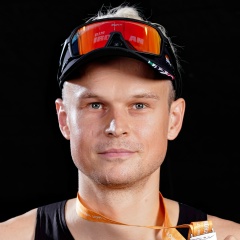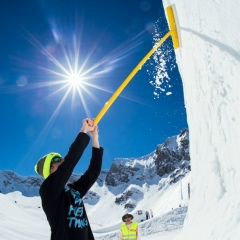Одна из главных бед наших в английском - это неправильное употребление времен английских глаголов. Привожу здесь очень даже полезное пособие. После двух прочтений насмерть запоминается.
Система английских времен с точки зрения употребления глагола “to vodka”
1. Во-первых, необходимо уяснить, что в этом языке существуют глаголы:
1.1. неопределенные (Indefinite), т.е. неизвестно, пьешь ты или нет,
1.2. длительные (Continuous), т.е. ты давно и продолжаешь,
1.3. завершенные (Perfect), т.е. ты либо вышел из запоя, либо уже окончательно напился и вырубился.
2. Во-вторых, существует объективное:
2.1. настоящее (Present) - ваше отношение к спиртному,
2.2. прошлое (Past) - темное или светлое,
2.3. будущее (Future) – то, что нам светит: цирроз, белая горячка и т.д.
3. Теперь все смешиваем.
3.1. Present:
3.1.1. Present Indefinite (настоящее неопределенное), см. выше.
I vodka every day. - Я пью водку каждый день. Вместо
every day можно употреблять выражения: usually, seldom, often,
from time to time, from melkaya posuda, bolshimi glotkami…
3.1.2. Present Continuous (настоящее длительное):
I am vodking now. – Я пью водку сейчас.
Для эмфатического усиления с этим временем можно употреблять
наречия:
He is constantly vodking! – Он постоянно поддатый!
3.1.3. Present Perfect (настоящее завершенное):
I have already vodked. - Я уже нажрамшись. (В ответ на
предложение выпить)
3.1.4. Present Perfect Continuous (настоящее завершенно-продолженное):
I have been vodking since childhood.
- Я пью водку с детства (тип inclusive).
- Я пил водку с детства, но уже не пью (тип exclusive).
3.2. Past :
3.2.1. Past Indefinite (прошедшее неопределенное):
I vodked yesterday. - Я напился вчера.
(не путать со временем 3.1.3., там ты напился только что).
3.2.2. Past Continuous (прошедшее длительное):
Часто употребляется, как придаточное предложение к главному во
времени 3.2.1
- Unfortunately, I was vodking at the moment my wife came.
- К несчастью, я пил водку в тот момент, когда пришла жена.
3.2.3. Past Perfect (прошедшее завершенное):
Также употребляется, как придаточное.
- I had already vodked when my wife came.
- Я уже упился, когда вошла жена.
3.2.4. Past Perfect Continuous (прошедшее звершенно-продолженное):
- I had been vodking for about a month when my wife came.
- Я пил водку уже около месяца, когда вошла моя жена.
3.3. Future :
3.3.1. Future Indefinite (будущее неопределенное):
I will vodka tomorrow. - Я буду пить водку завтра.
Примечание: В придаточных предложениях времени и условия
(т.е. при отсутствии подходящего времени и условий) вместо
времени 3.3.1. употребляется время 3.1.1.:
- If I vodka tomorrow I will be sick the day after tomorrow.
- Если я выпью завтра, я буду болеть послезавтра.
3.3.2. Future Continuous (будущее длительное):
I will be vodking tomorrow at 5. - Я буду заниматься
употреблением горячительных напитков завтра в 5.
Примечание: При горячем желании опохмелиться вместо
времени 3.3.1. можно употреблять время 3.3.2. :
- Soon! Soon I will be vodking!
- Скоро! Скоро я буду пить водку!
3.3.3. Future Perfect (будущее завершенное):
Употребляется при планировании состояния опьянения
- To morrow by 5 o’clock I will have vodked.
- Завтра к пяти я буду нажрамшись.
3.3.4. Future Perfect Continuous (будущее завершенно-длительное):
- By to morrow morning I will have been vodking for a week.
- К завтрашнему утру я буду пить водку неделю.
Система английских времен с точки зрения употребления глагола “to vodka”
1. Во-первых, необходимо уяснить, что в этом языке существуют глаголы:
1.1. неопределенные (Indefinite), т.е. неизвестно, пьешь ты или нет,
1.2. длительные (Continuous), т.е. ты давно и продолжаешь,
1.3. завершенные (Perfect), т.е. ты либо вышел из запоя, либо уже окончательно напился и вырубился.
2. Во-вторых, существует объективное:
2.1. настоящее (Present) - ваше отношение к спиртному,
2.2. прошлое (Past) - темное или светлое,
2.3. будущее (Future) – то, что нам светит: цирроз, белая горячка и т.д.
3. Теперь все смешиваем.
3.1. Present:
3.1.1. Present Indefinite (настоящее неопределенное), см. выше.
I vodka every day. - Я пью водку каждый день. Вместо
every day можно употреблять выражения: usually, seldom, often,
from time to time, from melkaya posuda, bolshimi glotkami…
3.1.2. Present Continuous (настоящее длительное):
I am vodking now. – Я пью водку сейчас.
Для эмфатического усиления с этим временем можно употреблять
наречия:
He is constantly vodking! – Он постоянно поддатый!
3.1.3. Present Perfect (настоящее завершенное):
I have already vodked. - Я уже нажрамшись. (В ответ на
предложение выпить)
3.1.4. Present Perfect Continuous (настоящее завершенно-продолженное):
I have been vodking since childhood.
- Я пью водку с детства (тип inclusive).
- Я пил водку с детства, но уже не пью (тип exclusive).
3.2. Past :
3.2.1. Past Indefinite (прошедшее неопределенное):
I vodked yesterday. - Я напился вчера.
(не путать со временем 3.1.3., там ты напился только что).
3.2.2. Past Continuous (прошедшее длительное):
Часто употребляется, как придаточное предложение к главному во
времени 3.2.1
- Unfortunately, I was vodking at the moment my wife came.
- К несчастью, я пил водку в тот момент, когда пришла жена.
3.2.3. Past Perfect (прошедшее завершенное):
Также употребляется, как придаточное.
- I had already vodked when my wife came.
- Я уже упился, когда вошла жена.
3.2.4. Past Perfect Continuous (прошедшее звершенно-продолженное):
- I had been vodking for about a month when my wife came.
- Я пил водку уже около месяца, когда вошла моя жена.
3.3. Future :
3.3.1. Future Indefinite (будущее неопределенное):
I will vodka tomorrow. - Я буду пить водку завтра.
Примечание: В придаточных предложениях времени и условия
(т.е. при отсутствии подходящего времени и условий) вместо
времени 3.3.1. употребляется время 3.1.1.:
- If I vodka tomorrow I will be sick the day after tomorrow.
- Если я выпью завтра, я буду болеть послезавтра.
3.3.2. Future Continuous (будущее длительное):
I will be vodking tomorrow at 5. - Я буду заниматься
употреблением горячительных напитков завтра в 5.
Примечание: При горячем желании опохмелиться вместо
времени 3.3.1. можно употреблять время 3.3.2. :
- Soon! Soon I will be vodking!
- Скоро! Скоро я буду пить водку!
3.3.3. Future Perfect (будущее завершенное):
Употребляется при планировании состояния опьянения
- To morrow by 5 o’clock I will have vodked.
- Завтра к пяти я буду нажрамшись.
3.3.4. Future Perfect Continuous (будущее завершенно-длительное):
- By to morrow morning I will have been vodking for a week.
- К завтрашнему утру я буду пить водку неделю.
One of our main troubles in English is the misuse of the tenses of English verbs. I bring here a very useful guide. After two reads, death is remembered.
The system of English tenses in terms of the use of the verb “to vodka”
1. Firstly, it is necessary to understand that in this language there are verbs:
1.1. indefinite, i.e. It’s not known whether you drink or not,
1.2. Continuous, i.e. you continue for a long time
1.3. completed (Perfect), i.e. you either got out of hard drinking, or you got completely drunk and passed out.
2. Secondly, there is an objective:
2.1. present - your attitude to alcohol,
2.2. the past (Past) - dark or light,
2.3. future (Future) - what shines for us: cirrhosis, delirium tremens, etc.
3. Now we mix everything.
3.1. Present:
3.1.1. Present Indefinite, see above.
I vodka every day. - I drink vodka every day. Instead
every day you can use the expressions: usually, seldom, often,
from time to time, from melkaya posuda, bolshimi glotkami ...
3.1.2. Present Continuous:
I am vodking now. - I'm drinking vodka now.
For emphatic enhancement with this time you can use
adverbs:
He is constantly vodking! - He's constantly hot!
3.1.3. Present Perfect:
I have already vodked. - I'm already drunk. (In response to
offer to drink)
3.1.4. Present Perfect Continuous:
I have been vodking since childhood.
- I have been drinking vodka since childhood (inclusive type).
- I have been drinking vodka since childhood, but no longer drink (type exclusive).
3.2. Past:
3.2.1. Past Indefinite:
I vodked yesterday. - I got drunk yesterday.
(not to be confused with time 3.1.3., there you just got drunk).
3.2.2. Past Continuous:
Often used as a relative clause to the main
time 3.2.1
- Unfortunately, I was vodking at the moment my wife came.
- Unfortunately, I drank vodka at the moment when my wife came.
3.2.3. Past Perfect (past completed):
Also used as a subordinate clause.
- I had already vodked when my wife came.
“I was already drunk when my wife came in.”
3.2.4. Past Perfect Continuous:
- I had been vodking for about a month when my wife came.
“I have been drinking vodka for about a month when my wife came in.”
3.3. Future:
3.3.1. Future Indefinite:
I will vodka tomorrow. - I will drink vodka tomorrow.
Note: In relative clauses of time and condition
(i.e. in the absence of suitable time and conditions) instead
time 3.3.1. time 3.1.1 is used .:
- If I vodka tomorrow I will be sick the day after tomorrow.
“If I drink tomorrow, I will be sick the day after tomorrow.”
3.3.2. Future Continuous:
I will be vodking tomorrow at 5. - I will be engaged
drinking strong drinks tomorrow at 5.
Note: If you have a burning desire to get a hangover instead
time 3.3.1. you can use time 3.3.2. :
- Soon! Soon I will be vodking!
- Coming soon! Soon I will drink vodka!
3.3.3. Future Perfect:
Used when planning a state of intoxication
- To morrow by 5 o’clock I will have vodked.
“Tomorrow by five I'll be drunk.”
3.3.4. Future Perfect Continuous:
- By to morrow morning I will have been vodking for a week.
- By tomorrow morning I will drink vodka for a week.
The system of English tenses in terms of the use of the verb “to vodka”
1. Firstly, it is necessary to understand that in this language there are verbs:
1.1. indefinite, i.e. It’s not known whether you drink or not,
1.2. Continuous, i.e. you continue for a long time
1.3. completed (Perfect), i.e. you either got out of hard drinking, or you got completely drunk and passed out.
2. Secondly, there is an objective:
2.1. present - your attitude to alcohol,
2.2. the past (Past) - dark or light,
2.3. future (Future) - what shines for us: cirrhosis, delirium tremens, etc.
3. Now we mix everything.
3.1. Present:
3.1.1. Present Indefinite, see above.
I vodka every day. - I drink vodka every day. Instead
every day you can use the expressions: usually, seldom, often,
from time to time, from melkaya posuda, bolshimi glotkami ...
3.1.2. Present Continuous:
I am vodking now. - I'm drinking vodka now.
For emphatic enhancement with this time you can use
adverbs:
He is constantly vodking! - He's constantly hot!
3.1.3. Present Perfect:
I have already vodked. - I'm already drunk. (In response to
offer to drink)
3.1.4. Present Perfect Continuous:
I have been vodking since childhood.
- I have been drinking vodka since childhood (inclusive type).
- I have been drinking vodka since childhood, but no longer drink (type exclusive).
3.2. Past:
3.2.1. Past Indefinite:
I vodked yesterday. - I got drunk yesterday.
(not to be confused with time 3.1.3., there you just got drunk).
3.2.2. Past Continuous:
Often used as a relative clause to the main
time 3.2.1
- Unfortunately, I was vodking at the moment my wife came.
- Unfortunately, I drank vodka at the moment when my wife came.
3.2.3. Past Perfect (past completed):
Also used as a subordinate clause.
- I had already vodked when my wife came.
“I was already drunk when my wife came in.”
3.2.4. Past Perfect Continuous:
- I had been vodking for about a month when my wife came.
“I have been drinking vodka for about a month when my wife came in.”
3.3. Future:
3.3.1. Future Indefinite:
I will vodka tomorrow. - I will drink vodka tomorrow.
Note: In relative clauses of time and condition
(i.e. in the absence of suitable time and conditions) instead
time 3.3.1. time 3.1.1 is used .:
- If I vodka tomorrow I will be sick the day after tomorrow.
“If I drink tomorrow, I will be sick the day after tomorrow.”
3.3.2. Future Continuous:
I will be vodking tomorrow at 5. - I will be engaged
drinking strong drinks tomorrow at 5.
Note: If you have a burning desire to get a hangover instead
time 3.3.1. you can use time 3.3.2. :
- Soon! Soon I will be vodking!
- Coming soon! Soon I will drink vodka!
3.3.3. Future Perfect:
Used when planning a state of intoxication
- To morrow by 5 o’clock I will have vodked.
“Tomorrow by five I'll be drunk.”
3.3.4. Future Perfect Continuous:
- By to morrow morning I will have been vodking for a week.
- By tomorrow morning I will drink vodka for a week.
У записи 1 лайков,
0 репостов.
0 репостов.
Arina Grigorieva оставил(а) запись на стене пользователя Алексей Мальков






















